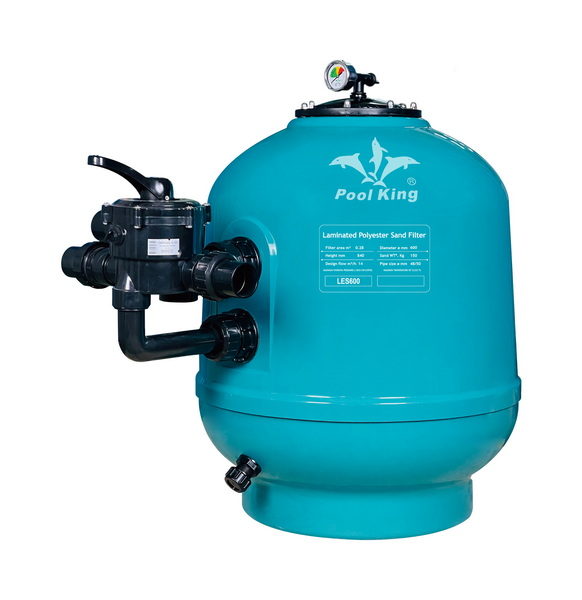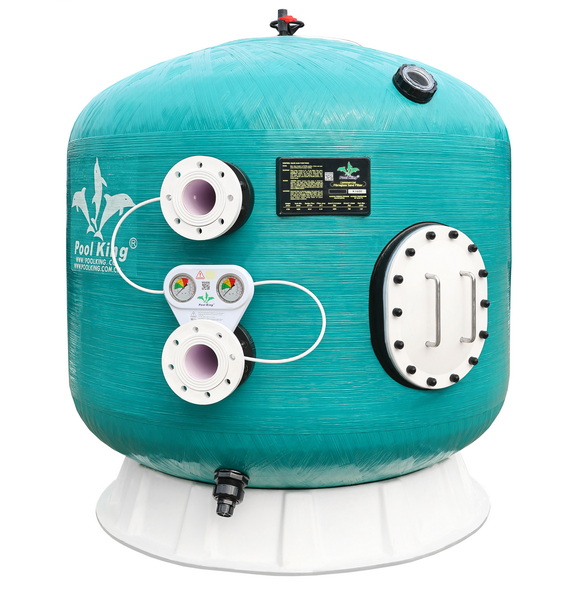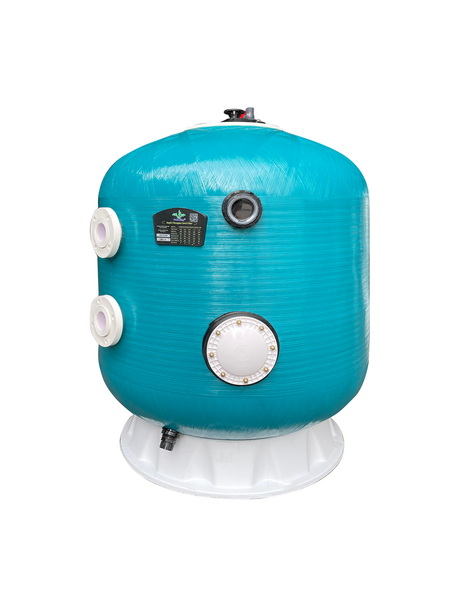Views: 222 Author: Tina Publish Time: 2025-07-23 Origin: Site








Content Menu
● Types of Pool Filters and Backwashing
>> Sand Filters
>> DE (Diatomaceous Earth) Filters
● Why Is Backwashing Important?
● How Often Should You Backwash a Pool Filter?
>> Factors Affecting Backwashing Frequency
● Step-by-Step Guide: How to Backwash a Sand Filter
>> Preparation
● Signs Your Pool Filter Needs a Backwash
● Expert Tips for Pool Filter Maintenance
>> 1. How do I know it's time to backwash my pool filter?
>> 2. Can I backwash too often?
>> 3. How long should each backwash take?
>> 4. Do all filters require backwashing?
>> 5. How often should I replace the filter media?
The clarity and hygiene of your swimming pool largely depend on the efficiency of its filtration system. A critical aspect of pool maintenance is backwashing, a process that cleans your pool filter by reversing water flow to remove trapped debris. But how often should you backwash your pool filter? In this comprehensive guide, we'll dive deep into the types of pool filters, the science behind backwashing, frequency recommendations, step-by-step guides, troubleshooting common problems, and expert tips for maintaining pristine pool water. Numerous images and videos are included to enhance your understanding and ensure effortless application.
Maintaining your pool filter correctly not only ensures clear water but can also extend the life of your filter system, optimize the performance of your pool pump, and save you money on repairs and water consumption. For pool owners and professionals alike, understanding when and how to backwash is an essential skill.

Backwashing is the process of reversing the water flow through your pool's filter media to flush out dirt, debris, algae, and other impurities that have accumulated during normal filtration. Normally, pool water flows through the filter from top to bottom (through sand or DE media), trapping debris along the way. When flow is reversed during backwashing, these contaminants are lifted and expelled through the waste line, restoring the filter's efficiency.
By forcing water backward through the filter medium, backwashing cleans the media, removing dirt and debris that have clogged the pores of the sand, DE grids, or other filtration materials.
Sand filters are among the most popular pool filter types used worldwide. Inside the filter tank is a specially graded sand bed that traps dirt particles as water flows through it. Over time, these particles accumulate, causing the filter to clog and pressure to increase. When this happens, backwashing is essential to flush out the debris and restore the filter's efficiency.
The sand within these filters doesn't need frequent replacement but does require occasional maintenance. Normally, sand should be changed every 3 to 5 years or sooner if you notice sand running into the pool or reduced filtration performance.
DE filters utilize grids or fingers coated with diatomaceous earth powder, allowing them to trap particles smaller than those caught by sand filters, resulting in crystal-clear water quality. Like sand filters, DE filters need to be backwashed regularly to remove debris buildup. Additionally, fresh DE powder must be added after each backwash to recoat the grids and maintain filtration quality.
Unlike sand and DE filters, cartridge filters do not require backwashing. Instead, they are cleaned by removing the cartridge elements and hosing them down offsite. With regular cleaning (every few weeks) and eventual replacement (annually or when worn), cartridge filters provide reliable filtration without the need for backwashing.
Backwashing is fundamental to pool filtration for several reasons:
- Prevents filter clogging: Removes trapped debris that restrict water flow and cause higher pressure.
- Maintains water clarity: Efficient filtration removes contaminants that cloud the pool water.
- Protects pool equipment: High filter pressure strains pumps and heaters, leading to premature failure.
- Enhances safety: Clean water reduces bacterial and algae growth, ensuring healthy swim conditions.
- Saves costs: Regular backwashing prevents costly repairs and extends filter media life.
When filters become clogged, pressure increases, making the pump work harder and consuming more electricity. The water circulation efficiency decreases, possibly leading to unsatisfactory chemical dispersion and stagnant water zones in the pool.
Determining the proper backwashing frequency is critical for pool owners and maintenance personnel, as it balances maintaining water quality and conserving water and chemicals.
- Sand Filters: Backwash every 2–4 weeks during heavy pool usage or when the pressure gauge reads 8–10 PSI above clean operating pressure.
- DE Filters: Typically backwash every 1–3 months depending on pressure gauge readings and water flow.
- Cartridge Filters: Do not backwash; clean by rinsing or replacing cartridges.
Most experts recommend relying on filter pressure gauges rather than fixed schedules. The gauge tells you how clogged the media is and when backwashing is necessary. Avoid backwashing too frequently as this results in wasted water and chemicals, and might degrade filter media faster.
Several environmental and usage factors can influence how often you need to backwash:
1. Pool Usage: Larger numbers of swimmers or frequent pool parties increase debris and contaminants.
2. Surrounding Environment: Pools near dense vegetation, trees, or dusty areas accumulate more debris.
3. Weather Conditions: Storms, heavy winds, and pollen seasons introduce extra particulates.
4. Water Chemistry: Poorly balanced water chemistry causes faster filter fouling.
5. Type and Size of Filter: Larger or higher-capacity filters may require less frequent backwashing.
Your filter's pressure gauge is critical for informed maintenance. Record the normal pressure for your system under clean conditions. When the pressure rises approximately 8 to 10 PSI above this baseline, it signals the filter media is clogged and backwashing is needed.

Proper backwashing is a simple process but essential to follow exactly to prevent damage.
- Ensure your pool's water level is adequate; add water if below halfway up the skimmer opening.
- Turn off the pool pump.
- Connect the backwash hose securely and open the waste line valve. Make sure the discharge can safely release water.
- Check your filter's user manual for specific instructions and valve positions.
1. Turn off the pump if not already off.
2. Move the multiport valve to the “Backwash” position.
3. Turn the pump on. Water will flow in reverse through the filter beds, lifting debris into the waste line.
4. Watch the sight glass or observe the waste water hose. Run this cycle until the water appears clear—usually takes 2 to 3 minutes.
5. Turn pump off when water clears.
1. Turn the valve to “Rinse” and run the pump for 30 seconds to settle the filter media and prevent debris from returning to the pool.
2. Turn the pump off.
3. Move the valve back to “Filter” position.
4. Turn the pump back on and check normal operation.
5. Add water to the pool if necessary to replace wasted water.
DE filters follow a similar procedure to sand filters but require an additional step after backwashing:
1. Backwash as described above for 1–2 minutes or until water runs clear.
2. Rinse for 30 seconds, then return the valve to filter.
3. Turn off the pump and add fresh DE powder (amount varies by filter size) to the skimmer, so it coats the grids.
4. Restart the pump and check system for normal operation.
Always follow your manufacturer's instructions when adding DE powder and disposing of waste water securely, as DE contains fine silica particles.
Tuning into your pool's filter system can prevent water issues and equipment damage:
- Increasing filter pressure gauge by 8–10 PSI over the baseline.
- Noticeably reduced water flow from return jets.
- Cloudy or murky pool water developing.
- Accumulated algae or debris despite chemical treatment.
- Visible debris being pushed back into the pool water.
If you experience any of these signs, inspect and backwash your filter as needed to maintain optimal performance.
- Backwashing too frequently: Leads to excessive water and chemical waste and can shorten filter media life.
- Ignoring the pressure gauge: A broken or inaccurate gauge can mislead maintenance schedules.
- Not rinsing after backwashing: Skipping the rinse cycle can send dirty water back into the pool.
- Failing to add DE powder after backwashing a DE filter: Severely reduces filtration efficiency.
- Forgetting to ensure valves are fully set in the correct position: Can damage your pump or filter.
- Ignoring leaks or abnormal noises: These may indicate valve damage or pump issues that require professional attention.
- Replace sand every 3–5 years. Over time, the grains become smooth and inefficient.
- Inspect and replace pressure gauges regularly to maintain accurate readings.
- Perform monthly visual inspections of your filter system for leaks or damage.
- Maintain chemical balance in your pool water, as imbalances cause quicker filter clogging.
- Ensure proper water levels to prevent pump damage or reduced filter efficiency.
- Invest in quality filter equipment, such as automated backwash valves or smart pressure sensors to optimize your maintenance schedule.
Consistent and proper backwashing of your pool filter is pivotal for a sparkling, healthy, and inviting swimming pool. By recognizing the signs of filter clogging and following recommended schedules guided by your filter's pressure gauge and local conditions, you can save time and maintenance costs while extending your filter's lifespan. Whether you own a sand or DE filter, regular care ensures optimal water quality and peace of mind throughout the swimming season.
Remember, backwashing is not just about cleaning the filter—it's about preserving your pool's filter system and maintaining an enjoyable swim environment.

When the pressure gauge reads 8–10 PSI higher than the clean baseline or you notice reduced water flow.
Yes, over-backwashing wastes water and chemicals and may degrade filter media performance prematurely.
Typically, 2–3 minutes for sand filters and 1–2 minutes for DE filters—until waste water runs clear.
No. Cartridge filters do not—they require manual removal and rinsing of the filter element.
Sand should be replaced roughly every 3–5 years; DE powder must be replenished after every backwash as per instructions.
Learn how to convert a frame pool ladder into a safe, professional deck ladder with proper planning, flanges, and anchors. This step‑by‑step guide covers tools, installation, safety checks, maintenance, and OEM opportunities for pool ladder and filtration system suppliers.
This detailed guide explains how to clean under a Confer pool ladder step by step, remove algae and stains, and keep the ladder and hidden areas safe and spotless. Learn tools, cleaners, shock routines, and ongoing maintenance tips to prevent algae from returning under any pool ladder.<br />
This in‑depth guide explains how to clean a resin pool ladder step by step, remove algae, stains, and scale, and protect the ladder from damage. Learn tools, cleaners, safety tips, and maintenance routines to keep every pool ladder safe, bright, and long‑lasting all season.<br />
This comprehensive guide explains how to clean a pool ladder step by step, remove scale, stains, and rust, and protect it from future damage. Learn tools, routines, seasonal tips, plus content ideas to keep every pool ladder safe, stable, and professional‑looking.<br />
Learn how to clean your aluminum pool ladder step by step, remove stains and oxidation, and protect it from corrosion. Discover easy maintenance tips to keep your pool ladder safe, shiny, and long‑lasting all season.<br />
Learn how to hook up pool filter hoses step by step for sand, cartridge, and DE systems. This detailed guide covers skimmer, pump, and pool filter connections, diagrams, leak‑prevention tips, and FAQs so your pool filter runs smoothly all season.<br />
Learn how to hide your pool filter and pump with smart screens, sheds, landscaping, and multi‑purpose furniture. Discover safety rules, noise‑reduction tricks, and design ideas to keep pool filter equipment quiet, accessible, and invisible in a clean, resort‑style backyard.<br />
Learn how to clean a pool filter pump impeller step by step, restore strong water flow, and protect your pool filter system. Discover warning signs, quick cleaning methods, deep disassembly tips, and preventive maintenance to keep your pool crystal clear and your pump running efficiently.<br />
Learn how to change a Bestway pool filter without losing water. Step‑by‑step methods for cartridge and sand filters, essential tools, safety tips, and maintenance advice to keep your Bestway above‑ground pool clear, efficient, and easy to manage all season.<br />
Learn how to change a Bestway pool filter step by step. This detailed guide covers cartridge and sand pool filter pumps, safety tips, backwash and rinse, maintenance schedules, troubleshooting, and FAQs to keep your above‑ground pool crystal clear all season.<br />
Learn how to backwash a Bestway pool filter step by step, including valve settings, backwash and rinse times, pressure‑gauge tips, and maintenance advice. Keep your sand pool filter efficient, protect your pump, and enjoy consistently clear, healthy pool water with simple, repeatable routines.<br />
Learn how to add diatomaceous earth to a pool filter step by step, including safety tips, DE dose calculations, backwashing, DE mixing and skimmer charging, pressure‑gauge checks, and maintenance advice for crystal‑clear pool water and long‑lasting DE pool filter performance.<br />
This in‑depth guide explains how often to clean a Pentair pool filter, with specific schedules for sand, cartridge, and DE systems, pressure‑based rules, seasonal adjustments, troubleshooting signs, and OEM‑level pool filter solutions for international brands and professional buyers.<br />
Learn how often to change an Intex pool filter, how to clean cartridge, sand, and DE filters, and how to keep above-ground pool water crystal clear with simple, effective maintenance habits.<br />
This in‑depth guide explains how often to run a pool filter for clear, healthy water. Learn ideal daily runtime for sand, cartridge, and DE pool filters, how turnover works, seasonal adjustments, energy‑saving tips, and OEM pool filter solutions for professional buyers.<br />
Learn how to safely reset a pool pump step by step, from basic power‑cycling and priming to keypad and factory resets for variable‑speed pool pumps. Avoid damage, restore circulation fast, and know when to call a professional.<br />
A pool pump is the heart of any swimming pool, circulating water through filters, heaters, and sanitizers to keep it clean, clear, and safe. Learn what a pool pump does, how it works, how long to run it, and how to choose efficient OEM pool pump solutions for residential and commercial pools.<br />
Learn how to hook up a swimming pool pump the right way with this 2,000‑plus word step‑by‑step guide. Discover planning tips, plumbing and wiring basics, priming advice, troubleshooting ideas, and essential pool pump FAQs for cleaner, clearer pool water.<br /> <p> </p> , and maintain a pool pump so your pool water st
This in‑depth 2026 guide explains how much for pool pump, covering typical prices by type, pool size, and brand, plus installation, repair, and energy costs, and OEM options for brands, wholesalers, and manufacturers seeking efficient, high‑value pool pump solutions.<br />
This detailed guide shows how to hide Pool pump equipment with fences, screens, landscaping, benches and rock features while preserving ventilation, safety and easy maintenance, so your Pool pump stays quiet, discreet and reliable.<br />
